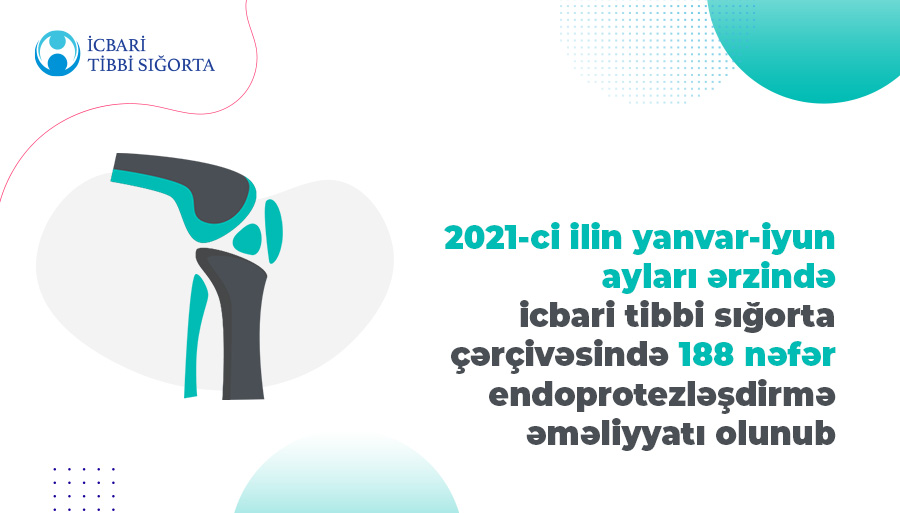28 October 2021 15:34
During the first six months of this year, 188 people underwent hip and knee joint replacement under the mandatory health insurance program
According to reports received by the State Agency on Mandatory Health Insurance (Agency), in January-June 2021, 188 people underwent hip and knee joint replacement under the mandatory health insurance program in the country.
Joint replacement, a surgical medical service, is performed free of charge for citizens within the Service Package of mandatory health insurance. According to the Benefit Package, the number of endoprosthesis operations covered by mandatory health insurance during the calendar year was established as 300. Based on the date of application, the requests of 300 citizens who applied for the operation this year, were approved by the Agency. It should be noted that applications received after the limit for the calendar year was exceeded, will be considered next year.
The conditions for the provision of this medical service to the insured are reflected in the relevant decision of the Cabinet of Ministers. Joint replacement involves partial and total replacement of the thigh joint, as well as total replacement of the knee joint.
This operation, which cannot be performed in state medical facilities and requires special medical equipment and coverage, is performed in relevant medical facilities contracted by the Agency. Operations are carried out according to medical indications on the principle of alternating the patient with the highest degree of danger to life and health with the patient with the least degree of danger to life and health.
It should be noted that an endoprosthesis is a prosthesis placed inside the body that replaces a diseased organ. During an endoprosthesis operation, a damaged joint is replaced with an artificial joint. Endoprosthesis surgery is not performed for people under 18 years of age as this operation may adversely affect their physical development in the future, as the cartilage part of the bones, the growth zones, are not yet completely developed. It is also not recommended for people with active infections in any part of the body.
In addition to the medical services included in the service package, citizens do not pay for the preoperative examination and medical consultation, anesthesia, resuscitation and hospitalization, in-patient laboratory and instrumental examinations, as well as medical supplies such as the endoprosthesis. Medicines and medical supplies used during the operation, as well as doctor's follow-up are included in the tariff of medical services.
In addition, if necessary, some patients receive physiotherapy to relieve weakness and tension in certain tendons and muscles before and after surgery. At the same time, physical therapy procedures are performed to strengthen the muscles, stimulate and open the joints. To receive this service under mandatory health insurance, a citizen may apply to state medical facilities controlled by the Administration of Regional Medical Divisions (TABIB). According to the Service Package, there are 10 sessions in each physiotherapy service, which is sufficient for the patient's recovery.
Examples of joint dysfunction include rheumatic diseases, congenital joint pathologies, intra-articular fractures or injuries, metabolic disorders, and overweight problems.
After the operation, the patient returns to a normal life after 3 months, using a walking aid for 4 to 6 weeks. During this period, the artificial joint is reinforced, the patient's pain is eliminated, and he regains his physical activity. Thus, surgery not only restores a person's ability to work, but also prevents disability.
News
İcbari tibbi sığorta ilə 182 000-dən artıq doğuş aparılıb
16 July 2024 11:10
Diz oynağının endoprotezləşməsində İsveçrə istehsalı protezlərdən istifadə olunur
12 July 2024 10:42
Kəskin orta otitin cərrahi müalicəsi icbari tibbi sığorta ilə qarşılanır
09 July 2024 11:11
Tiroidektomiya əməliyyatı icbari tibbi sığorta ilə ödənişsizdir
05 July 2024 10:25
İcbari tibbi sığorta ilə qasıq yırtığı açıq və laparoskopik üsulla icra olunur
01 July 2024 15:18
İcbari Tibbi Sığorta üzrə Dövlət Agentliyinin nümayəndə heyəti Yaponiyaya işgüzar səfər edib
28 June 2024 10:51
İcbari tibbi sığorta ilə 540 splenektomiya əməliyyatı icra olunub
24 June 2024 14:52
Zaur Əliyev Goranboy şəhərində vətəndaşları qəbul edib
21 June 2024 17:00
İcbari tibbi sığorta uşaqlığın çıxarılması əməliyyatını qarşılayır
21 June 2024 10:57
Agentlik, TƏBİB və Ankara Universiteti üçtərəfli anlaşma memorandumu imzaladı
14 June 2024 14:49










